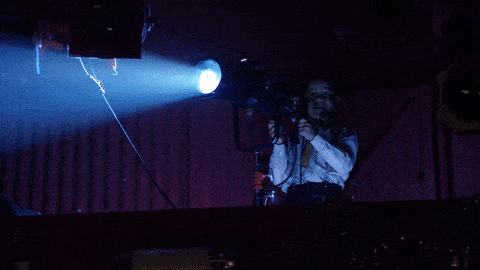10 Tips for Overcoming Stage Fright
Your palms start sweating, your muscles tense up, your heart beats so loud you think that, certainly, the whole audience can hear. Stage fright, also called performance anxiety, is a common ailment that affects many musicians, from beginners to professionals. If you’re one of the millions who suffer

Your palms start sweating, your muscles tense up, your heart beats so loud you think that, certainly, the whole audience can hear. Stage fright, also called performance anxiety, is a common ailment that affects many musicians, from beginners to professionals. If you’re one of the millions who suffer from stage fright, know that you’re not alone, that it’s not your fault, and that there are activities and exercises you can do to help naturally overcome the anxiety.

What Exactly is Stage Fright?
First, let’s understand why we feel stage fright. It’s a natural reaction due to the body’s fight or flight response, a biological survival adaptation that kicks in when we feel threatened. We naturally want the approval of others, and when we’re front-and-center under a spotlight, we can experience the threat of not gaining that approval.
Even after performing countless of times and garnering nothing but praise, many still experience stage fright. For example, Barbra Streisand is known to use a teleprompter during live performances due to anxiety, Adele has spoken openly about her fear of audiences, and John Lennon would get physically ill prior to performing as a symptom of stage fright.
Thankfully, there are measures we can take to lessen the severity of our stage fright symptoms, both on the big day itself and between performances. We’ve pulled together 10 activities and exercises that we rely on to perform without fear.
1. Prepare
We all know the importance of practice prior to a big recital or performance, but if you suffer from stage fright it might be helpful to take it one step further. While practicing your piece, envision exactly what you’ll think about while performing the piece. Visualize upcoming difficult passages while you play and immerse yourself in the rhythm. Don’t allow yourself to go into auto-pilot practice mode, but rather fully engage with the music.

Next, instead of practicing by yourself at home, ask close friends and family that you feel comfortable playing in front of to serve as your audience. If you’re able, take it a step further by practicing at the venue you’ll be performing at. If that’s not possible, find a similar location, or try performing at a variety of locations, which can help get rid of setting distractions altogether.
The bottom line is that you should know your music like the back of your hand. Memorization can be a huge stressor on performers, so do yourself a favor and eliminate it from the get go!
2. Skip the Coffee
You may think it’ll help you be more alert, but caffeine and sugar can actually agitate the negative symptoms of stage fright. It’s best to avoid sugary foods or caffeinated beverages the day of your performance. Be especially aware that if you’re sipping some tea to sooth a tired or sore throat, it should be non-caffeinated! Believe us, the natural pre-performance adrenaline boost will be more than enough to keep you alert and energized.

Pro Tip: If you’re feeling overly energized, try eating a banana. Its natural beta-blockers may help regulate your energy levels.
3. Accept the Fear
A lot of times when people experience stage fright they tend to blame themselves, thinking that there is abnormal about feeling nervous. Accepting that what you’re feeling is a natural biological response can be incredibly freeing and will allow you to work past your stage fright.
4. Don’t Focus on Yourself
Try not to think about the way you look, sound, or feel. Instead, think about how cool it is that you have an opportunity to bring enjoyment to others!
5. Be Confident
Don’t fixate on what could go wrong, but rather imagine all your preparation, skills, and musical talent aligning perfectly. Remember that your audience is there to support and encourage you. Avoid any and all feelings of self-doubt.

6. Listen to Music
Sports psychologists have long encouraged athletes to listen to music prior to big competitions, and some of the same benefits can cross over to musicians as well. For one, we can choose songs to put us into the right mood. If you need a boost, pick a song that fires you up. If you need to relax, listen to your favorite chill-out song.
7. Relax and Focus
We all have our own way of entering ‘the zone.’ Practice your relaxation technique ahead of time, so that it’s ready to go when you need it. One suggestion is to find a quiet spot to sit. Slowly take 10 full breaths, in and out, through your nose. Count each breath as you go.

8. Stretch
Stretching will help loosen tense muscles and allow you to focus on something other than your jitters right before the show. Take it easy, concentrate on your movements, and shake it out when you’re done. Imagine all the negative energy leaving your body.
Pro Tip: If you’re feeling extra jittery, do a few exercises (like push-ups or jumping jacks) to release some adrenaline.
9. Use the Facilities
It may sound silly, but DON’T FORGET TO USE THE BATHROOM. Believe us, we speak from experience when we say there’s nothing worse for stage fright than having to ‘go’ when you step onto the stage.
10. Enjoy Every Moment
Smile as you walk onto the stage and look at the audience. Imagine all the people who supported you during practice out there cheering you on. Perform like you know you can and graciously accept their applause at the end. Not only will you kill your performance, but you’ll overcome your stage fright to do so!

We hope that these tips have been helpful for you and that you will be motivated to perform through your stage fright. We’re rooting for you, and we know you’ve got this!

